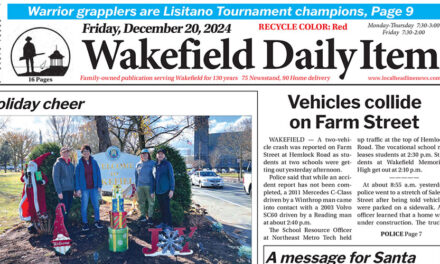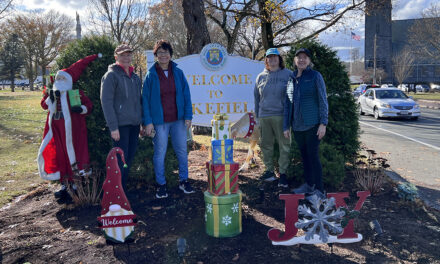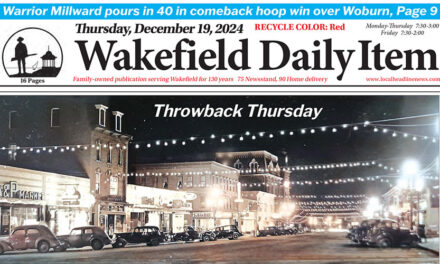Published in the September 29, 2016 edition.
By MARK SARDELLA
Wakefield is good at hosting really big parties: Festival Italia, the Holiday Stroll and Independence Day are prime examples. Soon to take its place alongside those is the upcoming Halloween spectacular, “Haunted Happenings.”
But what if you can’t make it for some reason? Or what if you were there and just want to relive the experience or share it with your fellow citizens?
Well, of course you can always turn to us in the dead tree media for our insightful and incisive coverage.
There’s no denying, however, that people go to social media knowing that people who did attend the event can’t help sharing their thoughts, photos and maybe even a video on Facebook, Twitter, Instagram or any of the other platforms that have sprung up in the last five minutes.
But what did people do before all this newfangled technology? I’m not just talking about the olden days of the 20th Century, when phones had cords and people typed on things called “typewriters” that weren’t even connected to each other and some – get this – weren’t even plugged in!
I’m talking about going way back, before the Internet, before computers, before Wakefield even had a local newspaper! What did these primitive denizens of our glorious town do before there were cat videos to like on Facebook all day long? And how did they share information before there was any local media (social or otherwise)?
To find out, we have to go back nearly a century and a half, to a sweltering July Fourth in 1868.
With the possible exception of a Wakefield Civic League “Chat,” there has hardly been a more momentous event in the annals of our town than the day we became Wakefield. That day was observed on Saturday, July 4, 1868, as South Reading celebrated changing its name to Wakefield in honor of Cyrus Wakefield.
With his Wakefield Rattan Company, the wealthy Mr. Wakefield was South Reading’s largest employer. He also gave the town $100,000 to build a new Town Hall, so in appreciation, the town changed its name to Wakefield. (Something to think about, if you’ve got a hundred grand or so burning a hole in your pocket.)
The town threw a huge party, combining the celebration of the name change with the birthday of the country, which at the time was less than a hundred years old.
So how did people share the experience of events like this before there was even a newspaper in town, much less a Wakefield page on Facebook?
They wrote books – little ones, short ones – not just to record the event for posterity but to share it contemporaneously with those unable to participate. Facebook without the “face,” you might say.
Such a book was written for the “Inaugural Exercises in Wakefield, Mass.,” and it turned out to be especially important on July 4, 1868.
It may shock you to learn that even before we human beings destroyed the planet with our carbon-belching, fossil fuel-powered planes, trains and automobiles, there were extremely hot days in the summer. What we now know to be Climate Change, our ignorant forebears blamed on “weather.”
Such a day was July 4, 1868, as the authors of the “Inaugural Exercises” book noted, adding that they “more readily complied” with the public demand for such a record “in consideration of the fact that the intense heat prevailing on the day of the celebration permitted the attendance of comparatively few of those desirous of listening to the literary exercises of that occasion.” (Clearly, word count was not an issue in 1868.)
But contrary to the image of our 19th Century forebears as stodgy, humorless types, the men who wrote of this occasion saw fit to address the day’s heat with a little levity. They spoke of the town’s “emerald lawns and leafy avenues, which, throughout the day were filled with happy and perspiring company.”
OK, so Paul D’Angelo they weren’t, but in 1868 that line got a lot of laughs.
But they weren’t just comedians. They were poets too. Most of the speakers that day included at least a few lines of poetry in their speeches, while others spoke entirely in verse.
John S. Eaton wrote and recited an original, 11-page, 74-stanza poem sharing his reflections on Wakefield. And by all accounts, people sat through the entire epic and enjoyed it! I daresay that the next time you see a poem about Wakefield on Facebook will be the first time.
Toward the end of the day’s exercises, a representative of the press was accorded an opportunity to share a few thoughts. E.N. Walton of the Salem Register, a native of Wakefield, delivered a “very appropriate and pleasing speech, of which no copy was preserved.”
Even then, the press got no respect.




